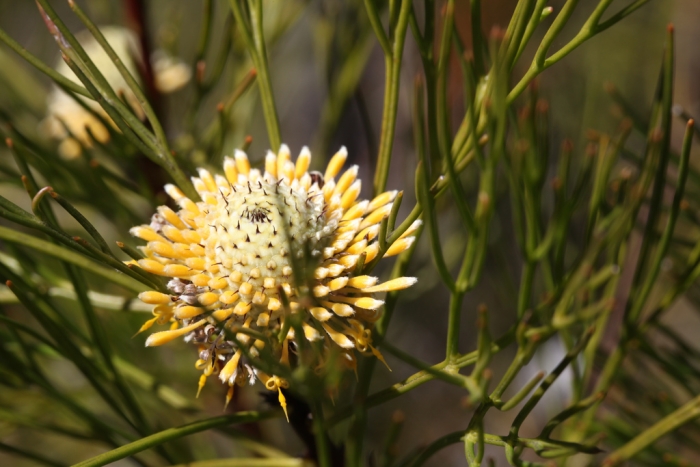Narrow-Leaf Drumsticks
(Isopogon anethifolius)
Narrow-Leaf Drumsticks (Isopogon anethifolius)
/
/

Moonlight0551 from Australia
CC BY 2.0
Image By:
Moonlight0551 from Australia
Recorded By:
Copyright:
CC BY 2.0
Copyright Notice:
Photo by: Moonlight0551 from Australia | License Type: CC BY 2.0 | License URL: https://creativecommons.org/licenses/by/2.0 | Uploader: File Upload Bot (Magnus Manske) | Publisher: Wikimedia Commons | Title: Narrow_Leaf_Drumstick_-_Isopogon_anethifolius_(7970118766).jpg | Notes: |





















































Estimated Native Range
Summary
Isopogon anethifolius, commonly known as Narrow-Leaf Drumsticks, is an evergreen shrub native to the sandy heath and coastal scrublands of New South Wales, Australia. It typically grows to a height of 3 m (9.8 ft) and features terete leaves that are divided and narrow. The plant is characterized by its bright yellow, globular flower heads that bloom in spring, which are quite showy and attract a variety of pollinators. After flowering, it produces distinctive round grey cones, resembling drumsticks, which contain small hairy seeds within the old flower parts. These cones contribute to the plant’s ornamental value throughout the year.
Narrow-Leaf Drumsticks are valued for their fine foliage, red stems, and vibrant yellow flowers, making them an attractive addition to gardens. They are often used as screening plants due to their dense foliage, which provides privacy. In cultivation, they thrive in acidic soils and benefit from additional watering, although they are intolerant of waterlogged conditions. A part-shaded position is ideal, but they can also adapt to full sun. The species is frost-tolerant down to −8 °C (20 °F). To promote healthy growth, applying fertilizer in spring is recommended. Pruning can help manage long stems that may droop over time. Propagation is possible through cuttings or seeds, with germination occurring after 30 to 60 days, though flowering may take several years from seed. Cultivation generally requires full sun to part shade, medium water, and well-drained soils.CC BY-SA 4.0
Narrow-Leaf Drumsticks are valued for their fine foliage, red stems, and vibrant yellow flowers, making them an attractive addition to gardens. They are often used as screening plants due to their dense foliage, which provides privacy. In cultivation, they thrive in acidic soils and benefit from additional watering, although they are intolerant of waterlogged conditions. A part-shaded position is ideal, but they can also adapt to full sun. The species is frost-tolerant down to −8 °C (20 °F). To promote healthy growth, applying fertilizer in spring is recommended. Pruning can help manage long stems that may droop over time. Propagation is possible through cuttings or seeds, with germination occurring after 30 to 60 days, though flowering may take several years from seed. Cultivation generally requires full sun to part shade, medium water, and well-drained soils.CC BY-SA 4.0
Plant Description
- Plant Type: Shrub
- Height: 1.5-3 feet
- Width: 1.5-3 feet
- Growth Rate: Moderate
- Flower Color: Yellow
- Flowering Season: Spring, Summer
- Leaf Retention: Evergreen
Growth Requirements
- Sun: Full Sun, Part Shade
- Water: Medium
- Drainage: Medium
Common Uses
Bee Garden, Bird Garden, Butterfly Garden, Low Maintenance, Salt Tolerant, Showy Flowers, Street Planting
Natural Habitat
Sandy heath and coastal scrublands of New South Wales, Australia
Other Names
Common Names: Narrow-Leafed Drumsticks
Scientific Names: , Isopogon anethifolius, Protea acufera, Protea divaricata, Atylus anethifolius, Isopogon confertus, Isopogon divaricatus, Isopogon eriophorus, Isopogon globosus, Isopogon virgatulus
GBIF Accepted Name: Isopogon anethifolius (Salisb.) Knight